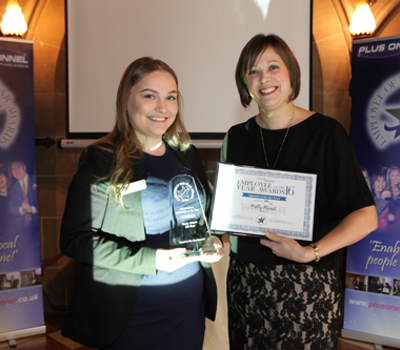Accountancy Apprenticeships
At the core of all business is Accounting, with opportunities across both public and private sectors. Apprenticeships in accountancy provide a structured approach to training and developing prospective Accountants, individuals who understand the needs of the organisation, its customers and the sector within which they operate.

Individuals working in finance functions, whether that be in accountancy practices or in finance teams across a wide range of industries and sectors.
At Level 2, relevant job roles include:
- Accounts/Finance Assistant
- Credit Control Clerk
- Purchase Ledger Clerk
- Sales Ledge Clerk
At Level 3, relevant job roles include:
- Trainee Accounting Technician
- Assistant Accountant
At Level 4, relevant job roles include:
- Accounting Technician
- Accounts Manager
At ACCA level 7, relevant job roles include:
Examples of roles as an Accountancy/Taxation Professional include, but are not limited to:
- Financial Accountant
- Management Accountant
- Tax Accountant
- Tax Adviser
- Tax Specialist
- External Auditor
- Internal Auditor
- Financial Analyst
- Management Consultant
- Forensic Accountant
Accountancy apprenticeships are available at intermediate level (level 2), advanced level (level 3) and higher level (level 4).
Examples of roles as an Accountancy/Taxation Professional include, but are not limited to:
- Financial Accountant n Management Accountant
- Tax Accountant n Tax Adviser
- Tax Specialist n External Auditor
- Internal Auditor n Financial Analyst
- Management Consultant n Forensic Accountant
What skills does it cover?
ACCA modules include:
- Corporate & Business Law n Management Accounting
- Taxation n Financial Reporting
- Audit & Assurance n Financial Management
- Governance, Risk & Ethics n Corporate Reporting
- Business Analysis n Advanced Taxation
- Account in Business n Financial Accounting
- Advanced Performance Management n Advanced Audit & Assurance Link to Professional Registration
Completion of the Accountancy/Taxation Professional Apprenticeship will result in eligbility to apply for membership of one or more of the UK Professional Bodies such as The Association of Chartered Certified Accountants (ACCA), subject to meeting the requirements expected by the regulator and/or the relevant regulations where chartered status is involved.
The Apprenticeship for the New Standards incorporate skills, behaviours and qualifications to ensure Apprentices are well rounded and able to perform better in their roles which give them invaluable skills in the following:
- Level 2 Maths and English (equvalent to GCSE Grade C or above), ideally as part of 5 GCSE A-C Grades or other compariible
qualifications - Apprentices without English and Maths at Level 2 must achieve this prior to the completion of the Level 7 Apprenticeship
- Apprentices who have completed a relevant Level 4 Accountancy Qualification may receive credits towards the
completion of the Apprenticeship - Employers have the flexibility to set their own minimum entry requirements and may want to increase their criteria
Institutes may also set specific entry requirements
Structure
Apprentices will gain technical knowledge required by studying ACCA units, but will also gain invaluable skills delivered by the training provider.
Key Responsibilities
Accountancy/Taxation Professionals provide financial information and advice to organisations of all types and sizes, from owner managed businesses, multi-national organisations, private enterprises to public sector institutions and from
entrepreneurs to public sector institutions, and entrepreneurs to charities.
How long does the qualification take?
Typically this Apprenticeship will take 36 months to complete (duration dependent on prior learning/relevant work experience).
What Does End-Point Assessment include?
Method 1 - Synoptic Case Study completed after the gateway.
The objective of the case study is to assess synoptically the apprentices’ understanding of complex business (or individual) issues and their ability to analyse financial and non-financial data, exercise professional scepticism and ethical judgement and develop conclusions and/or recommendations.. The scenario may be based on a variety of different organisational structures or operations and success at the case study will require an integration of the technical knowledge skills and behaviours required for the standard.
Method 2 - Project Report completed after the gateway
Apprentices will prepare a report based on their own recent relevant experience for each of the set requirements. They will be required to answer a series of 3-4 critical and evaluative skills and behaviours questions based on their work experience.
For further information, please contact our Business Development Team on 024 7623 1122 or email enquiries@cw-chambertraining.co.uk
- Preparing accounts
- Using IT and a range of software packages
- Managing purchase and sales ledgers
- Accurately recording financial transactions
- Supply information for managing the business
- Team work and problem solving
- Making and recording payments
Individuals will gain a Diploma in Accounting (from level 2 to level 4) as well as functional skills in Maths and English which are core aspects of an apprenticeship programme.
New to 2018...
What is the difference between a Level 7 Apprenticeship and the Professional Qualification?
Both contain professional exams and a focus on practical work experience as a pre-requisite for membership and both take around three years to complete. The main differences are skills and behavioural training must be completed and formally documented.
Apprenticeships must also include two forms of end-point assessment. Level 7 is likely to be the existing case study and a new reflective statement and all new Apprenticeships have to be graded
An intermediate accountancy apprenticeship at level 2 will take approximately 14 months to complete, followed by the advanced and higher level apprenticeships taking a further 12-14 months each.
New to 2018...
Typically the ACCA level 7 Apprenticeship will take 36 months to complete (duration dependent on prior learning/relevant work experience).
These apprenticeships do not impose any restrictions in terms of entry requirements. There is no minimum academic criteria for entry except where employers set their own requirements. A strong level of attainment in maths is generally required. The starting point is determined by an assessment of the individual’s job role and experience.
Entry requirements for ACCA level 7:
- Level 2 Maths & English
- Apprentices who have completed Level 4 Accountancy Qualification
- or a relevant Degree may receive credits towards the completion of the Apprenticeship


Key Benefits
Some of the key benefits for employers who partner with Coventry & Warwickshire Chamber Training...
Training

Our training courses are designed to provide you and your workforce with the desire to achieve, strive for excellence in the latest skills and techniques, ensuring ongoing business prosper.
Support

As an organisation we remain committed to designing learning around the latest market intelligence and industry trends that meets our customers’ needs.
Chamber of Commerce

We are proud to provide on going support to over 2,000 business in order to grow and improve their workforce.
Real Stories, Real People

Business Apprentice Molly Wins Apprentice of the Year Award

A Challenge for Spanish Juani

